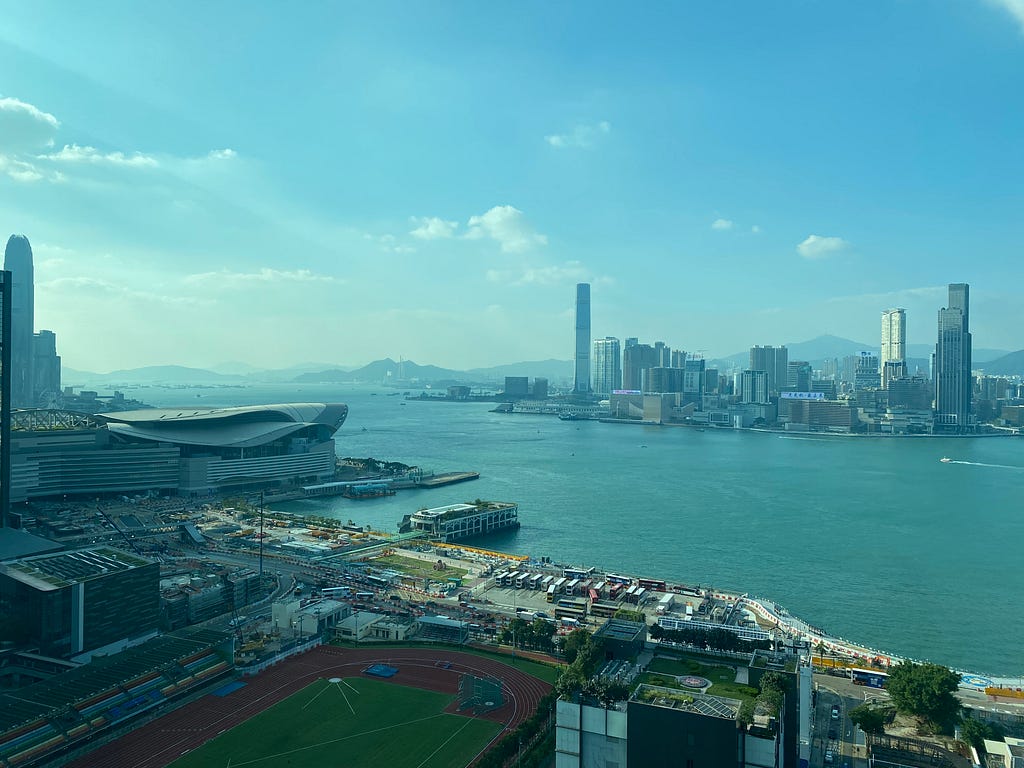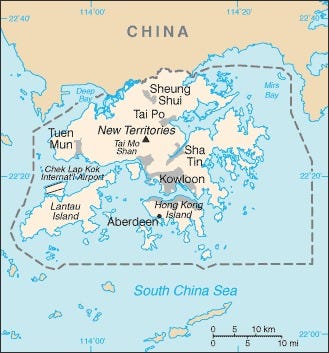Megacorporations, not states: Tales of Hong Kong, Singapore, and Macau
Foreword: I highly recommend reading my article on Hong Kong: More than just a ‘SAR’ in order to gain more context
Singapore is a city-state situated at the southern tip of the Malay peninsula. Onlookers would marvel at the country’s miraculous growth over the past decades. Far from the impoverished past, she is now a bustling metropolitan, a multicultural society, and a Republic that provides for all* its citizens.
*Subject to interpretations by the Singaporean government
If you look even closer, you might attribute this tremendous growth to the continuity of the Singaporean government. The ruling People’s Action Party (PAP) has never lost their power since the country’s founding. Stability in governance leads to being able to plan extremely long-term without having to worry about pesky election cycles. However, stability in rulership does not necessarily lead to long-term planning, nor does it entail growth. What does, is the continuous focus on appealing to businesses, and sometimes blurring the lines between corporate and state governance.
Some call this state capitalism, but there might not be the full picture. In Stellaris (a space strategy game set in the future developed by Paradox), there is a special government type called the Megacorp. The company is the state, and the state is the company. The state considers its commercial interest before all else, and other aspects of its external relations take a back seat.
Hong Kong, Singapore, and Macau are essentially (mega)corporations that have treaty signing abilities. Their citizens the labor pool, and their education system the corporate training. Their population did not come from a shared ethnic background like Germany or Korea, out came these cities newly forged identities that cut across nationality lines. Human rights isn’t a concern for the governments, does giving people free speech generate revenue?
A certain standard of human right and welfare is provided and expected, but not just for the good of the people. It is done to preserve and grow its labor pool. Their citizens are highly educated, it is not hard for them to locate overseas and start a new life. The three megacorps utilize different strategies to deal with this problem. Singapore makes illegal multiple citizenships, so you can either give up being a Singaporean, or remain forever tied to Singapore. Hong Kong more or less accepts this loss of population, however she makes up for it by open up to immigration for both skilled and unskilled labor through student-work-settle pathways, talent pathways, and direct immigration from China. Plus, if you are not of Chinese nationality, you will loss your ‘Permanent Residency’ (essentially citizenship as explained in my other article) if you leave Hong Kong for a continuous period of 3 years. Macau does it the brutally simple way, paying its citizens yearly, essentially corporate year-end bonuses in reward of their loyalty.
The situation is perhaps most evident in the case of Hong Kong. As a non-sovereign state (as explained in my other article), Hong Kong was designed by both the British and Chinese to be a megacorporation. The British introduced common law and free trade, while the role of Hong Kong was codified by the Chinese through the Hong Kong Basic Law (read: Constitution). Excluded from handling her own diplomacy, she is explicitly authorized to conduct ‘economic external affairs’ on her own. She is her own member in the WTO, APEC, and many other organizations that China is too happy to let her be in. Her ‘embassies’ are ‘Economic and Trade Offices (ETO)’, and her ‘President’ the ‘Chief Executive’.
Macau presents a far simpler business case. Read this, gambling. As of writing (6 Oct, 2021), Macau is battling a fresh local outbreak of COVID-19 and has mandated closure of many entertainment facilities. Surprise (or perhaps not)! Casinos are business as usual. As long as Asian countries still outlaw gambling in their territories, Macau will remain a popular destination for tourist to try some legal luck. With just 600 thousand citizens and not even an airport before 1995, Macau plays a far less influential role than Hong Kong with only 5 overseas representative offices when Hong Kong has 18. Good thing is, casinos are far simpler to operate than say an international arbitration center that Hong Kong is trying to be.
What is perhaps more interesting is, in Hong Kong and Macau, companies have the legal right to vote as legal persons, just as their natural person counterparts. This is a process called the ‘Functional Constituency’ where instead of basing seats in the legislature solely geographic divisions, it is based also on different industries. Agriculture & Fisheries sector gets one seat, legal sector gets another, accountancy gets one, you get the idea. Corporations and individuals within a given sector has the right to register as voters and vote for their particular functional constituency. Corporations now have the legal right to vote and direct participation in politics.
All three megacorps have discriminatory practices for certain foreign workers. It is no different than outsourcing unwanted work to a foreign country, except in a much more direct manner. In Hong Kong, foreign domestic helpers are statutorily excluded from the minimum wage protection, and no matter how many years they stay in Hong Kong, they will never be entitled to any right of abode and have to return home when their contracts expire. This also applies to their children who are born in Hong Kong, their residency will forever be temporary. In Macau, non-local workers (commonly referred to as blue card holders) are also similarly, never entitled to staying in Macau no matter how long they have worked here. In Singapore, a work permit holder even has to apply for approval to marry a Singaporean or permanent resident, and can only get pregnant or deliver a baby once they are married to a Singaporean or permanent resident. The three megacorps practices openly discriminatory policies on foreign workers, and the only laws that govern their practices are the laws they write themselves.

Imagine living in a place where the grocery store chains, the power company that provides for your electricity, the phone company, the media, the restaurant chains, the port that imports all the stuff you need, and even the very place you live in are built and owned by one company, and ultimately one man. You do not have to imagine. That place is Hong Kong and the man is Li Ka-Shing. He is so powerful that urban legend (half serious) has it that he can influence whether Hong Kong Observatory issues a Typhoon 8 warning, in which case Hongkongers would not have to go to work and make him lose money.
One of the richest places on Earth, and one of the most unequal places on Earth. Listening to a joyful instrumental allegro playing at Li’s restaurant chain, designed to make you eat faster, have a higher turn over rate and make him more money. All hail the mighty King who provides for everything. All hail the modernity of our city. There exists all the amenities that you can think of, as long as you can afford it.
How utopian. How dystopian.
There is no past, no future, no present.
There is only profit.
References
https://www.britannica.com/topic/Peoples-Action-Party
https://news.rthk.hk/rthk/en/component/k2/1604212-20210804.htm
https://www.airport-technology.com/projects/macau-international-airport-macau/
https://www.dsedt.gov.mo/en_US/web/public/pg_eetr_tr?_refresh=true
https://www.gov.hk/en/about/govdirectory/oohk.htm
https://www.hkiac.org/
http://www.dsi.gov.mo/QAndA_e.html
https://www.fdh.labour.gov.hk/en/home.html
https://en.wikipedia.org/wiki/Template:HK_Functional_constituencies
https://www.legco.gov.hk/education/files/english/Exhibition_Panels_Supplementary_Notes/Composition-of-the-LegCo.pdf
https://www.mom.gov.sg/faq/foreign-worker/as-a-work-permit-holder-how-do-i-apply-for-approval-to-marry-a-singaporean-or-permanent-resident
https://www.mom.gov.sg/-/media/mom/documents/statistics-publications/a-guide-for-foreign-workers-english-malay.pdf
https://www.comm.hkbu.edu.hk/bumsc/015/pdf/lees.pdf (Chinese only)
https://www.hk01.com/%E7%A4%BE%E6%9C%83%E6%96%B0%E8%81%9E/168867/%E6%9D%8E%E5%98%89%E8%AA%A0%E9%80%80%E4%BC%91-%E4%B8%80%E5%9C%96%E7%9C%8B%E6%B8%85%E6%9D%8E%E6%B0%8F%E4%B8%89%E7%88%B6%E5%AD%90-%E6%A5%AD%E5%8B%99%E5%88%86%E5%B8%83%E5%90%84%E8%A1%8C%E5%90%84%E6%A5%AD (Chinese only)
https://worldpopulationreview.com/country-rankings/gini-coefficient-by-country
https://www.worldometers.info/gdp/gdp-per-capita/

